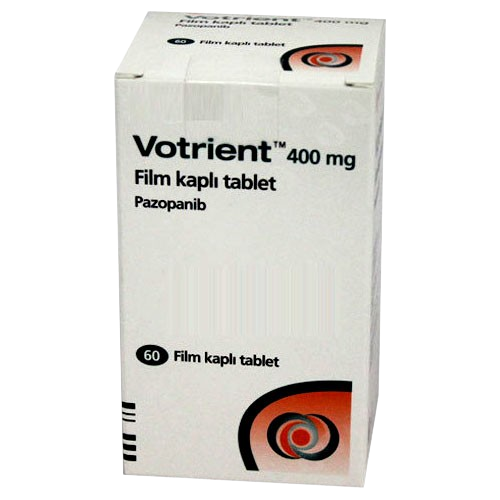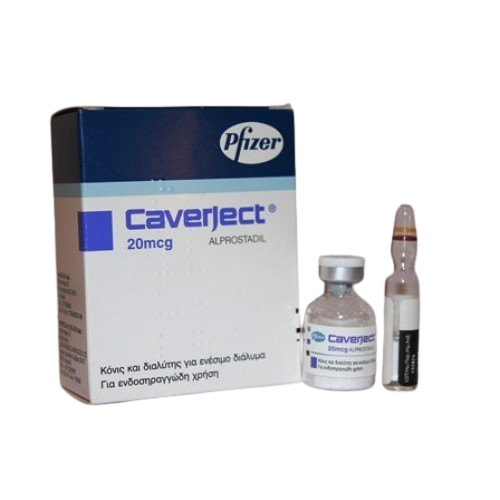Votrient 400mg 60’ct tablet
Votrient 400mg tablets are used to treat advanced renal cell carcinoma (RCC) and certain subtypes of soft-tissue sarcoma (STS). Here are some key details about Votrient 400mg tablets:
Indications
- Renal Cell Carcinoma (RCC): Votrient is indicated for the first-line treatment of advanced RCC and for patients who have received prior cytokine therapy for advanced disease.
- Soft-Tissue Sarcoma (STS): Votrient is indicated for the treatment of adult patients with selective subtypes of advanced STS who have received prior chemotherapy for metastatic disease or who have progressed within 12 months after (neo) adjuvant therapy.
Dosage and Administration
- Recommended Dosage: The recommended dose is 800 mg once daily, taken on an empty stomach at least 1 hour before or 2 hours after a meal.
- Dose Modifications: Dose modifications (decrease or increase) should be in 200 mg decrements or increments in a stepwise fashion based on individual tolerability to manage adverse reactions. The dose should not exceed 800 mg.
>IMPORTENT NOTE… Those customers who belongs to lahore avail the opportunity of cash on delivery(COD) with in 30mints.
> Available on cheap price
> ALL ALTERNATIVES BRANDS ARE AVAILABLE
>ORIGNAL & IMPORTED
> For maore details & price kindly contact on whatsapp.
Original price was: ₨70,000.00.₨63,999.00Current price is: ₨63,999.00.
Description
Votrient 400mg tablets are used to treat advanced renal cell carcinoma (RCC) and certain subtypes of soft-tissue sarcoma (STS). Here are some key details about Votrient 400mg tablets:
Indications
- Renal Cell Carcinoma (RCC): Votrient is indicated for the first-line treatment of advanced RCC and for patients who have received prior cytokine therapy for advanced disease.
- Soft-Tissue Sarcoma (STS): Votrient is indicated for the treatment of adult patients with selective subtypes of advanced STS who have received prior chemotherapy for metastatic disease or who have progressed within 12 months after (neo) adjuvant therapy.
Dosage and Administration
- Recommended Dosage: The recommended dose is 800 mg once daily, taken on an empty stomach at least 1 hour before or 2 hours after a meal.
- Dose Modifications: Dose modifications (decrease or increase) should be in 200 mg decrements or increments in a stepwise fashion based on individual tolerability to manage adverse reactions. The dose should not exceed 800 mg.
Side Effects
- Common Side Effects: Fatigue, diarrhea, nausea, decreased weight, hypertension, decreased appetite, hair color changes, vomiting, tumor pain, dysgeusia, headache, musculoskeletal pain, myalgia, GI pain, and dyspnea.
- Serious Side Effects: Bradycardia, pneumothorax, and laboratory abnormalities such as increases in AST, ALT, glucose, alkaline phosphatase, total bilirubin, and potassium; decreases in albumin and sodium; and leukopenia, lymphocytopenia, thrombocytopenia, and neutropenia.
Contraindications and Precautions
- Pregnancy and Breastfeeding: Votrient is not recommended during pregnancy or while breastfeeding. Effective contraception should be used during treatment.
- Liver and Kidney Impairment: Dose modifications are necessary for hepatic impairment and in patients taking certain concomitant drugs.
- Drug Interactions: Avoid concomitant use of strong CYP3A4 inhibitors and inducers. Dose adjustments may be needed for certain medications.
Storage and Handling
- Storage: Store at 20°C to 25°C (68°F to 77°F).
- Packaging: Available in bottles of 30 or 60 tablets.
Availability
- Price: The price of Votrient 400mg tablets varies, with some sources listing it at around $560.93 per tablet.
Important Notes
- Specialist Administration: Votrient treatment should only be initiated by a physician experienced in the administration of anti-cancer medicinal products.
- Monitoring: Regular monitoring of blood pressure and blood cell counts is necessary during treatment.
Key Benefits
- Treats advanced renal cell carcinoma (kidney cancer) as a first-line therapy or for patients who have received prior cytokine therapy.
- Treats certain subtypes of advanced soft-tissue sarcoma in adults who have received prior chemotherapy or progressed within 12 months of (neo)adjuvant therapy.
- Slows tumor growth by inhibiting the enzymes (tyrosine kinases) responsible for cancer cell proliferation and new blood vessel formation.
Key Ingredient
- Pazopanib (as hydrochloride): Pazopanib is the active pharmaceutical ingredient in Votrient. It is a tyrosine kinase inhibitor that targets multiple receptor tyrosine kinases involved in tumor growth and angiogenesis.
Other key points:
- Votrient is only available as a brand-name drug, not as a generic.
- The recommended dosage is 800mg taken once daily on an empty stomach.
- Dose adjustments may be needed to manage adverse reactions.
- Votrient should only be prescribed by healthcare providers experienced in administering anti-cancer medications.
Votrient (pazopanib) works by inhibiting multiple tyrosine kinases, which are enzymes that play a crucial role in cell growth and proliferation. Specifically, it targets several key receptors involved in tumor growth and angiogenesis (the formation of new blood vessels). Here are the key mechanisms by which Votrient inhibits cancer cell growth:
- Tyrosine Kinase Inhibition: Votrient is a multi-tyrosine kinase inhibitor. It blocks the activity of various tyrosine kinases, including vascular endothelial growth factor receptors (VEGFR-1, -2, and -3), platelet-derived growth factor receptors (PDGFR-α and -β), fibroblast growth factor receptors (FGFR-1 and -3), stem cell factor receptor (c-Kit), interleukin-2 receptor inducible T-cell kinase (Itk), leukocyte-specific protein tyrosine kinase (Lck), and transmembrane glycoprotein receptor tyrosine kinase (c-Fms).
- Angiogenesis Inhibition: By blocking VEGFR-2, Votrient inhibits the signaling pathway that leads to the formation of new blood vessels, which are essential for tumor growth. This anti-angiogenic effect helps to starve the tumor of its blood supply, slowing its growth and progression.
- Tumor Cell Proliferation Inhibition: Votrient also inhibits the activity of PDGFR-α and -β, which are involved in the proliferation of tumor cells. By blocking these receptors, Votrient can slow the growth of cancer cells directly.
- Targeted Therapy: Votrient is a targeted therapy, meaning it specifically targets cancer cells while minimizing damage to healthy cells. This targeted approach helps to reduce side effects and improve treatment outcomes compared to traditional chemotherapy.
PazopanibAnti-cancer medicationMoreBrand nameVotrientMarketed byNovartisMechanismMulti-targeted receptor tyrosine kinase inhibitor that blocks tumour growth and inhibits angiogenesisBased on the search results, here is an overview of how Votrient (pazopanib) works to inhibit cancer cell growth:Mechanism of Action
Votrient (pazopanib) is a multi-tyrosine kinase inhibitor that works by blocking the activity of several key receptors involved in tumor growth and angiogenesis (the formation of new blood vessels):
- Inhibition of Tyrosine Kinases:
- Votrient inhibits the activity of various tyrosine kinases, including:
- Vascular endothelial growth factor receptors (VEGFR-1, -2, and -3)
- Platelet-derived growth factor receptors (PDGFR-α and -β)
- Fibroblast growth factor receptors (FGFR-1 and -3)
- Stem cell factor receptor (c-Kit)
- Interleukin-2 receptor inducible T-cell kinase (Itk)
- Leukocyte-specific protein tyrosine kinase (Lck)
- Transmembrane glycoprotein receptor tyrosine kinase (c-Fms)
- Votrient inhibits the activity of various tyrosine kinases, including:
- Inhibition of Angiogenesis:
- By blocking VEGFR-2, Votrient inhibits the signaling pathway that leads to the formation of new blood vessels, which are essential for tumor growth and progression. This anti-angiogenic effect helps to starve the tumor of its blood supply.
- Inhibition of Tumor Cell Proliferation:
- Votrient also inhibits the activity of PDGFR-α and -β, which are involved in the proliferation of tumor cells. By blocking these receptors, Votrient can slow the growth of cancer cells directly.

Dietary Restrictions
- Avoid Taking Votrient with Food: Votrient should be taken at least 1 hour before or 2 hours after a meal. Taking Votrient with food can affect the way the medication is absorbed and may increase the risk of side effects.
- Avoid Grapefruit Juice: Patients should not drink grapefruit juice while taking Votrient, as it may increase the chance of side effects.
Dietary Recommendations
- Timing of Dosing: Votrient should be taken at about the same time each day, either at least 2 hours after a meal or 1 hour before a meal.
- Swallow Tablets Whole: Patients should swallow the Votrient tablets whole with water. The tablets should not be broken or crushed, as this can affect the way the medication is absorbed.
- Stay Hydrated: Patients should drink plenty of water and stay hydrated while taking Votrient.
Dosage
- The recommended starting dose of Votrient is 800mg taken once daily.
- Votrient should be taken at least 1 hour before or 2 hours after a meal.
- The tablets should be swallowed whole and not crushed or broken.
- Dose reductions in 200mg increments may be needed to manage adverse reactions.
- For patients with moderate hepatic impairment, the starting dose should be reduced to 200mg per day.
- Votrient is not recommended for patients with severe hepatic impairment.
Storage
- Votrient tablets should be stored at room temperature between 20°C to 25°C (68°F to 77°F).
- Keep the medication away from light and moisture, and out of reach of children.
- Do not store in the bathroom.
- Do not flush unused tablets down the toilet. Properly dispose of expired or unused medication.
Reviews
- Votrient has been shown to be effective in treating advanced renal cell carcinoma and certain soft tissue sarcomas.
- Common side effects include fatigue, diarrhea, nausea, decreased weight, hypertension, and hair color changes.
- Serious side effects like hepatotoxicity, bradycardia, and pneumothorax can occur and require close monitoring.
- Overall, Votrient provides a targeted therapy option for patients with these advanced cancers, but the potential for significant side effects necessitates careful management by experienced oncologists.
Avoid Combinations with Certain Drugs
Votrient may have highly clinically significant interactions with some medications, especially:
- Certain antibiotics used to treat infections (e.g. clarithromycin, ketoconazole, itraconazole, rifamicin, telithromycin, voriconazzole)
- Medications used to treat HIV (e.g. atazanavir, indinavir, nelfinavir, ritonavir, saquinavir)
- Nefazodone, a medication used to treat depression
- Simvastatin for high cholesterol
- Esomeprazole and other medications that reduce stomach acid
The risk of taking Votrient with these drugs outweighs any potential benefit, so they should be avoided.
Potential for Moderate Interactions
Votrient may have moderately clinically significant interactions with over 480 other medications. Some examples include:
- Antiplatelet drugs, NSAIDs, aspirin, or blood thinners – increased risk of bleeding
- Medicines that can affect liver enzymes
- Grapefruit juice – avoid drinking while taking Votrient as it may increase side effects
The risk of these interactions should be carefully considered and monitored by your doctor. Alternative medications may be needed in some cases.
Importance of Informing Your Doctor
Tell your doctor about all the medicines you take, including prescription and over-the-counter drugs, vitamins, and herbal supplements. Keeping an updated list to show your doctor and pharmacist is recommended.Your doctor will need to monitor you more closely for side effects if you are taking any medications that may interact with Votrient. Dose adjustments may be necessary in some cases.
- Votrient also inhibits the activity of PDGFR-α and -β, which are involved in the proliferation of tumor cells. By blocking these receptors, Votrient can slow the growth of cancer cells directly.








Reviews
There are no reviews yet.